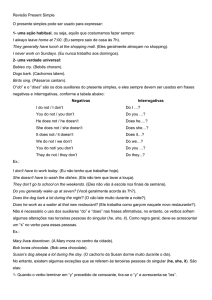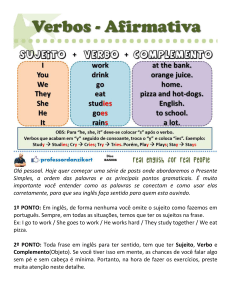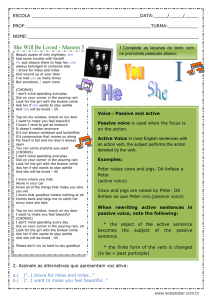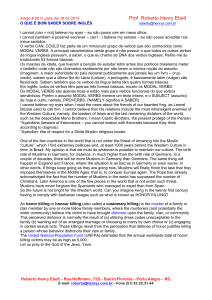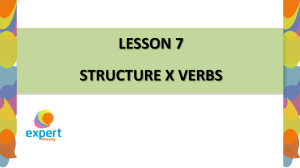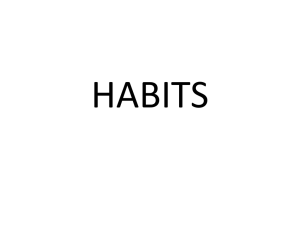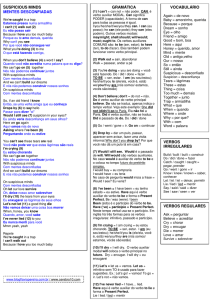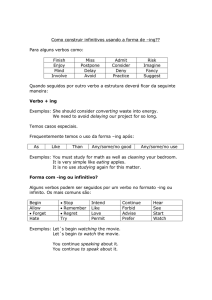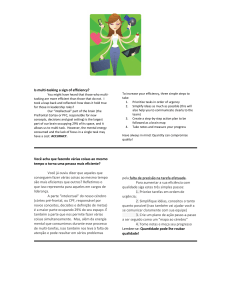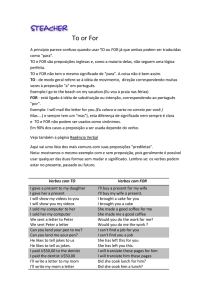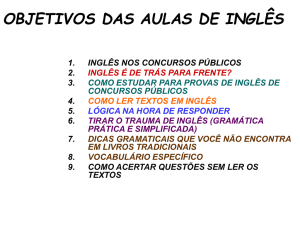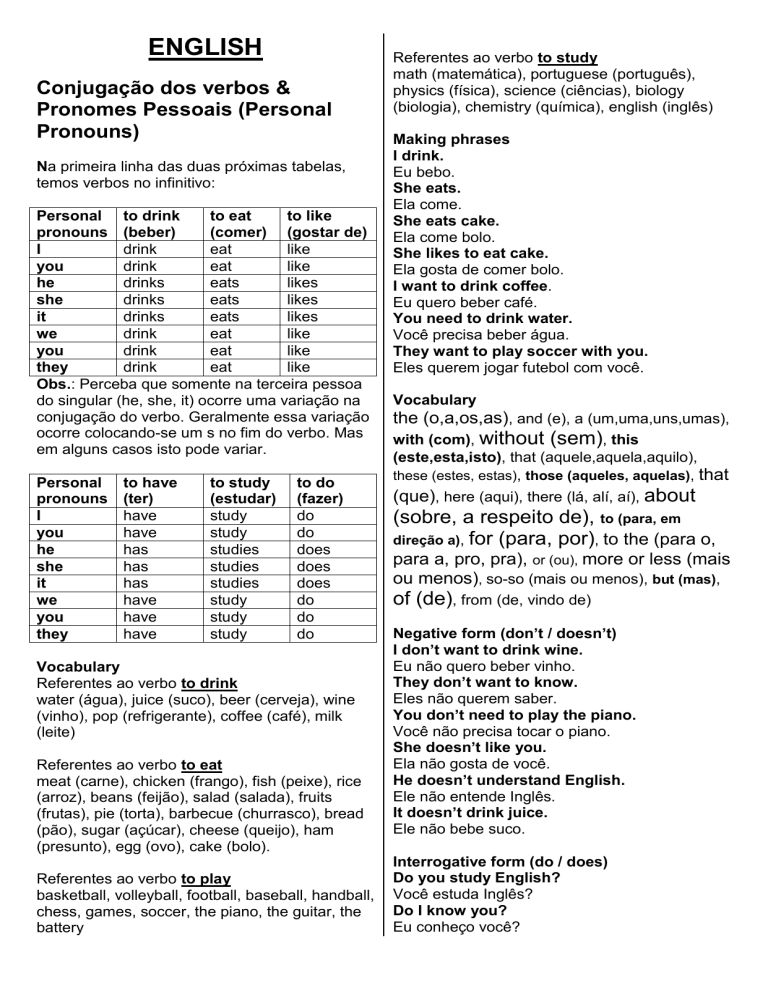
ENGLISH
Conjugação dos verbos &
Pronomes Pessoais (Personal
Pronouns)
Na primeira linha das duas próximas tabelas,
temos verbos no infinitivo:
Personal to drink
to eat
to like
pronouns (beber)
(comer) (gostar de)
I
drink
eat
like
you
drink
eat
like
he
drinks
eats
likes
she
drinks
eats
likes
it
drinks
eats
likes
we
drink
eat
like
you
drink
eat
like
they
drink
eat
like
Obs.: Perceba que somente na terceira pessoa
do singular (he, she, it) ocorre uma variação na
conjugação do verbo. Geralmente essa variação
ocorre colocando-se um s no fim do verbo. Mas
em alguns casos isto pode variar.
Personal
pronouns
I
you
he
she
it
we
you
they
to have
(ter)
have
have
has
has
has
have
have
have
to study
(estudar)
study
study
studies
studies
studies
study
study
study
to do
(fazer)
do
do
does
does
does
do
do
do
Vocabulary
Referentes ao verbo to drink
water (água), juice (suco), beer (cerveja), wine
(vinho), pop (refrigerante), coffee (café), milk
(leite)
Referentes ao verbo to eat
meat (carne), chicken (frango), fish (peixe), rice
(arroz), beans (feijão), salad (salada), fruits
(frutas), pie (torta), barbecue (churrasco), bread
(pão), sugar (açúcar), cheese (queijo), ham
(presunto), egg (ovo), cake (bolo).
Referentes ao verbo to play
basketball, volleyball, football, baseball, handball,
chess, games, soccer, the piano, the guitar, the
battery
Referentes ao verbo to study
math (matemática), portuguese (português),
physics (física), science (ciências), biology
(biologia), chemistry (química), english (inglês)
Making phrases
I drink.
Eu bebo.
She eats.
Ela come.
She eats cake.
Ela come bolo.
She likes to eat cake.
Ela gosta de comer bolo.
I want to drink coffee.
Eu quero beber café.
You need to drink water.
Você precisa beber água.
They want to play soccer with you.
Eles querem jogar futebol com você.
Vocabulary
the (o,a,os,as), and (e), a (um,uma,uns,umas),
with (com), without (sem), this
(este,esta,isto), that (aquele,aquela,aquilo),
these (estes, estas), those (aqueles, aquelas), that
(que), here (aqui), there (lá, alí, aí), about
(sobre, a respeito de), to (para, em
direção a), for (para, por), to the (para o,
para a, pro, pra), or (ou), more or less (mais
ou menos), so-so (mais ou menos), but (mas),
of (de), from (de, vindo de)
Negative form (don’t / doesn’t)
I don’t want to drink wine.
Eu não quero beber vinho.
They don’t want to know.
Eles não querem saber.
You don’t need to play the piano.
Você não precisa tocar o piano.
She doesn’t like you.
Ela não gosta de você.
He doesn’t understand English.
Ele não entende Inglês.
It doesn’t drink juice.
Ele não bebe suco.
Interrogative form (do / does)
Do you study English?
Você estuda Inglês?
Do I know you?
Eu conheço você?
Do they like to play with you?
Eles gostam de brincar com você?
Does he want to play the guitar?
Ele quer tocar guitarra?
Does she like to dance?
Ela gosta de dançar?
Obs.: Na terceira pessoa do singular, na forma
afirmativa, o verbo muda sua forma, porém,
quando é colocado na forma negativa ou
interrogativa, ele volta ao seu estado original.
She plays the guitar. (terceira pessoa SHE o
verbo ganha s)
Ela toca guitarra.
She doesn’t play_ the guitar. (usando o
DOESN’T some o s)
Ela não toca guitarra.
Does she play_ the guitar? (usando o DOES
some o s)
Obs.: Ache palavras que se relacionam com os
verbos abaixo:
to find (encontrar, achar)
to see (ver)
to watch (assistir)
to go (ir)
to buy (comprar)
to sell (vender)
to think (pensar)
to take (levar)
Exercises:
1) Traduza as frases para o Português; depois
escreva-as em Inglês na forma negativa:
a) He likes to eat pizza there.
b) We want to go with you tonight.
c) They need it now.
d) You have to stay here today.
e) She enjoys this music.
f) Helena dances with me everyday.
g) Raph and George live in Washington and
Imbiriba lives here in Brazil
2) Responda as perguntas abaixo usando
respostas afirmativas simples e negativas
simples:
a) Do you like to drink juice in the morning?
b) Does it drink water or milk?
c) Do they need to go there in the afternoon?
d) Does Michael want to eat pizza tonight?
e) Do Henry and Nesha watch TV at night?
Vocabulary - Greetings
Hi (oi), good morning (bom dia), good afternoon
(boa tarde), good evening (boa noite),
good night (boa noite), hello (olá, alô), bye-bye
(tchau), see you later (até mais tarde), see
you tomorrow (até amanhã), see you soon (até
logo), see ya (até), good bye (adeus),
thank you (obrigado), thanks (obrigado), thank
you very much (muito obrigado), be at ease
(fique à vontade)
Present Continuous (TO BE)
É um verbo diferenciado, devido sua conjugação
(usando as formas am, is e are), e devido ser
comum o uso da forma gerúndio em algumas
frases que possuem a forma TO BE. Assim se
refere a eventos que estão ocorrendo no
momento da comunicação.
I am
you are
he is
she is
it is
we are
they are
Conjugation
eu sou / eu estou
tu és / tu estás / você é /
você está / vocês são /
vocês estão
ele é / ele está
ela é / ela está
isto é / isto está / ele(a) é /
ele(a) está
nós somos / nós estamos
eles(as) são / eles(as)
estão
I’m
you’re
he’s
she’s
it’s
we’re
they’re
Making phrases
I am trying to study.
Eu estou tentando estudar.
She is waiting for you.
Ela está esperando por você.
They are communicating with you.
Elas estão comunicando-se com você.
I am thinking about that.
Eu estou pensando a respeito daquilo.
Negative form
Helena is not here.
Helena não está aqui.
It isn’t working well.
Isto não está funcionando bem.
Mikaella and Suzy aren’t going to the
stadium, they are going to the museum.
Mikaella and Suzy não estão indo pro estádio,
elas estão indo ao museu.
Kayle and I are not studying for the test, we
are palying PS5.
Kayle e eu não estamos estudando para o teste,
nós estamos jogando PS5.
Vocabulary – Wh question and How
What (o que, que, qual), When (quando),
Where (onde), Why (por que, o por que),
because (porque), who (quem), how (como,
forma definida). Segue abaixo uma tabela com
verbos Irregulares:
Verb
(Irregular)
Simple
Past
Participle
arise
arose
arisen
awake
awoke
awoken
be
was, were
bear
bore
been
born,
borne
beat
beat
beaten
become
befall
became
befell
beget
begot
become
befallen
begotten,
begot
sua, seus, suas), his (dele), her (dela), its
begin
began
begun
(dele, dela, disso, disto, deste, desta), our
(nosso, nossa, nossos, nossas), their
(deles, delas)
behold
beheld
beheld
bend
bent
bent
bet
bet
bet
bid
bid
bid
bind
bound
bound
bite
bit
bitten
bleed
bled
bled
blow
blew
blown
break
broke
broken
breed
bred
bred
bring
brought
brought
broadcast
broadcast
broadcast
build
built
built
buy
bought
bought
cast
cast
cast
catch
caught
caught
choose
chose
chosen
cling
clung
clung
come
cost
came
cost
come
cost
o quão), which (o qual, a qual, qual)
Interrogative form
Are you Mr. lionel?
Você é Sr. Lionel?
Is Diego using the computer now?
O Diego está usando o computador agora?
Is she leaving? Why is she doing this?
Ela está partindo? Porque ela está fazendo isso?
Are you thinking about that day?
Você está pensando naquele dia?
Vocabulary – Possessive Adjective
my (meu, minha, meus, minhas), your
(seu
Vocabulary – Object Pronouns
me (migo, eu), you (tigo, você, vocês), him
(ele, -o), her (ela, -a), it (ele, ela, -o, -a), us
(nosco, a gente), them (eles, -os, -as)
Exercises:
1) Reescreva as frases abaixo na língua inglesa:
a) Estou partindo porque ela está precisando de
mim.
b) O que eles estão fazendo com nossas
sacolas?
c) Onde Lasha está?
d) Ela está estudando Inglês na casa do amigo
dela.
e) O que você está fazendo aqui?
f) Sou seu amigo, mas estou aqui para pegar
meu livro.
g) Eles estão me explicando o que está
acontecendo com nossos amigos. Diga a ela que
estou pensando em ficar aqui esta noite.
Simple Past
Usamos o Simple Past para comunicarmos
sobre eventos que ocorreram no passado e não
ocorrem mais. Os verbos no passado podem ser
organizados em dois grupos: Regulares
(resumindo, são os verbos que terminam com –d
ou –ed) e Irregulares (verbos que não tem
Translation
into
Portuguese
surgir,
erguer-se
despertar,
acordar
ser, estar
suportar, dar
a luz
bater,
espancar
tornar-se
acontecer
procriar,
gerar
começar,
iniciar
contemplar
curvar,
dobrar
apostar
oferecer,
concorrer
unir,
encadernar
morder,
engolir a
isca
sangrar, ter
hemorragia
(as)soprar,
estourar
quebrar,
romper
procriar,
reproduzir
trazer
irradiar,
transmitir
construir,
edificar
comprar
arremessar,
lançar
pegar,
capturar
escolher
aderir,
segurar-se
vir
custar
creep
crept
cut
cut
deal
dealt
dig
dug
do
did
draw
drew
drink
drank
drive
drove
eat
fall
ate
fell
feed
fed
feel
felt
fight
fought
find
found
flee
fled
fling
fly
forbid
forget
forgive
flung
flew
forbade
forgot
forgave
freeze
froze
get
got
give
gave
go
grind
went
ground
grow
grew
have
had
hear
heard
hide
hit
hold
hid
hit
held
hurt
hurt
keep
kept
know
knew
rastejar,
gatinhar
cortar;
cut
reduzir
negociar,
dealt
tratar
cavar,
dug
cavoucar
done
fazer
sacar,
drawn
desenhar
drunk
beber
dirigir, ir de
driven
carro
eaten
comer
fallen
cair
alimentar,
fed
nutrir
sentir, sentirfelt
se
lutar;
fought
batalhar
achar,
found
encontrar
fugir,
fled
escapar
flung
arremessar
flown
voar, pilotar
forbidden
proibir
forgotten
esquecer
forgiven
perdoar
congelar,
frozen
paralizar
obter,
gotten, got
conseguir
dar,
given
conceder
gone
ir
ground
moer
crescer,
grown
cultivar
ter, beber,
had
comer
ouvir,
heard
escutar
hidden, hid
esconder
hit
bater, ferir
held
segurar
machucar,
hurt
ferir
guardar,
kept
manter
saber,
known
conhecer
crept
lay
lead
leave
laid
led
left
laid
led
left
lend
lent
lent
let
let
let
lie
lay
lain
lose
lost
lost
make
made
made
mean
meant
meant
meet
met
met
overcome
overcame
overcome
overtake
overtook
overtaken
pay
put
paid
put
paid
put
quit
quit
quit
read
read
read
ride
rode
ridden
ring
rang
rung
rise
rose
risen
run
ran
run
saw
say
see
seek
sell
sawed
said
saw
sought
sold
sawn
said
seen
sought
sold
send
sent
sent
set
set
set
shake
shook
shaken
shine
shone
shone
shoot
shot
shot
show
showed
shown
shrink
shrank
shrunk
shut
shut
shut
sing
sang
sung
sink
sank
sunk
pôr (ovos)
liderar, guiar
deixar, partir
dar
emprestado
deixar,
alugar
deitar(se)
perder,
extraviar
fazer,
fabricar
significar
encontrar,
conhecer
superar
alcançar,
surpreender
pagar
colocar, pôr
abandonar,
largar de...
ler
andar,
cavalgar
tocar
(campainha)
subir,
erguer-se
correr,
concorrer
serrar
dizer
ver; entender
procurar
vender
mandar,
enviar
pôr, colocar,
ajustar
sacudir,
tremer
brilhar,
reluzir
atirar, alvejar
mostrar,
exibir
encolher,
contrair
fechar,
cerrar
cantar
afundar,
submergir
sit
sat
sat
sentar
matar,
slay
slew
slain
assassinar
sleep
slept
slept
dormir
deslizar,
slide
slid
slid
escorregar
atirar,
sling
slung
slung
arremessar
speak
spoke
spoken
falar
gastar,
spend
spent
spent
passar
(tempo)
girar,
spin
spun
spun
rodopiar
spit
spit, spat
spit, spat
cuspir
espalhar,
spread
spread
spread
difundir
spring
sprang
sprung
saltar, pular
ficar de pé,
stand
stood
stood
agüentar
steal
stole
stolen
roubar, furtar
cravar,
stick
stuck
stuck
fincar, enfiar
cheirar mal,
stink
stank
stunk
feder
golpear,
strike
struck
struck
bater
encordoar,
string
strung
strung
amarrar
esforçar-se,
strive
strove
striven
lutar
jurar,
swear
swore
sworn
prometer
sweep
swept
swept
varrer
swim
swam
swum
nadar
balançar,
swing
swung
swung
alternar
tomar, pegar,
take
took
taken
aceitar
ensinar, dar
teach
taught
taught
aula
rasgar,
tear
tore
torn
despedaçar
contar (uma
tell
told
told
história)
think
thought
thought
pensar
atirar,
throw
threw
thrown
arremessar
pisar, trilhar,
tread
trod
trodden
seguir
entender,
understand understood understood
compreender
vestir, usar,
wear
wore
worn
desgastar
win
won
won
vencer,
write
wrote
written
ganhar
escrever,
redigir
Obs: Esta lista de verbos Irregulares não está
completa, porém possui a maioria desses
verbos. Já os verbos Regulares que não estão
nesta lista, serão revelados com o tempo, já que
se trata da grnde maioria dos verbos da Língua
Inglesa. Peça ao seu instrutor que lhe dê
exemplos de verbos Regulares e pesquise
alguns deles.
Negative Form
She didn’t like to know about them.
Ela não gostou de saber a respeito deles.
I didn’t mean that.
Eu não quis dizer aquilo.
They didn’t understand what you tried to do.
Eles não entenderam o que você tentou fazer.
We didn’t come here to lose.
Nós não viemos aqui para perder.
Interrogative Form
Did you understand?
Você entendeu?
Did you see what I saw?
Você viu o que eu ví?
Did you go to my house three days ago?
Você foi à minha casa há três dias atrás?
Did you watch the news yesterday night?
Você assistiu ao noticiário ontem à noite?
Obs: To Be é um verbo Irregular (was / were).
Simple Future and Future
Continuous (TO BE GOING TO)
I will play chess with him.
Eu jogarei xadrez com ele.
I am going to play chess with him.
Eu vou jogar xadrez com ele.
They will pick one number and bet tomorrow
night.
Eles pegarão um número e apostarão amanhã à
noite.
They are going to pick one number and bet
tomorrow night.
Eles vão pegar um número e vão apostar
amanhã à noite.
Você encontrará uma maneira de notar o que ele
vai desenhar?
He will talk to her next week.
Ele conversará com ela semana que vem.
He is going to talk to her next week.
Ele vai conversar com ela semana que vem.
Verb TO GO
Obs: Basicamente, quando usamos Will
praticamos a ‘linguagem formal’ e quando
usamos To Be Going To podemos entender
como ‘linguagem informal’.
Negative Form
I will not spend the night here.
Não passarei a noite aqui.
drugstore
supermarket
snack bar
movies
theater
She won’t forget the rules.
Ela não esquecerá as regras.
We won’t disobey their orders.
Não desobedeceremos as ordens deles.
I think he is not going to challenge us.
Eu acho que ele não vai nos desafiar.
They aren’t going to let you build that thing
again.
Eles não vão deixar você construir aquila coisa
novamente.
Nothing is going to change next time.
Nada vai mudar na próxima vez.
Obs: Quando usamos TO BE GOING TO,
podemos abreviar usando TO BE GONNA.
Exemplo: Nothing is gonna change / I’m gonna
kill you / They’re gonna tell us
Interrogative Form
Will you believe on it?
Você irá acreditar nisso?
Will he find a way to solve this problem?
Ele encontrará uma maneira de resolver este
problema?
Are you going to drive her car tomorrow?
Você vai dirigir o carro dela amanhã?
museum
university
hotel
airport
zoo
sidewalk
police department
port
train station
bus stop
park
bank
library
bookstore
gym
Is he going to survive?
Ele vai sobreviver?
church
Will you find a way to notice what he is going
to draw?
hospital
stadium
to buy medicines
and pills
to find many
products
(foodstuffs, food)
to have a drink and
tidbit
to watch a movie
eating popcorn and
drinking pop
to have fun
watching a show
to see plants,
animals…
to study
to reserve a room to
spend the night
to show the
passport, to buy the
ticket and take a
flight
to know the animals
to walk to the bus
stop
to denounce a crime
to take the ship or
boat
to get the train that
passes at nine
o’clock
to take the bus and
go home
to go out with my
boyfriend/girlfriend
to get money and
change it and talk to
the manager
to search
information about
history stuffs
to find some books
and take them home
to work out to fit in
the clothes
to pray and find
peace
to visit somebody
or realize a
treatment
to watch a game
to have gasoline
gas station
and watch over the
car
to take the children
playground
to have fun
to inform that I
fire department
know about a
dangerous fire
ice cream parlor
to take an ice cream
to buy stuffs and
shopping mall
clothes
to buy shoes, toys
shoe/toy/clothes/lottery
clothes and bet on
store
the lottery
to find bread and
bakery
cheese
to fix the hair or cut
beauty salon
the hair
to cross under the
cross walk
traffic light
restaurant
to have dinner
to find plants,
botanical garden
flowers and
vegetables
to take money in
ATM
cash at any time
to make plan to
travel agency
travel to other
countries
to get some red
flower shop
roses to offer to my
darling
to cross the avenue
overpass
safely
to take the elevator
building
to go up to the
fourth floor
to have a lunch and
food court
drinks
to get a hot dog
hot dog stand
with my friends
parking lot
to park the car
porque amanhã tenho que ir ao centro da cidade
e tenho que ir pra escola amanhã à noite).
Para dizermos, por exemplo: Diego irá ao
restaurante amanhã a noite, usamos go to the
(Diego will go to the restaurant tomorrow night).
Isso ocorre na maioria dos casos do verbo to go.
Mas para as palavras home (casa, lar),
downtown (centro da cidade) e school
(escola) (assim como alguns outros casos que
veremos à frente) não usamos o to the.
I need to go home now, because tomorrow I
have to go downtown and I have to go to school
tomorrow night. (Preciso ir pra casa agora,
Numbers
numbers
1
2
3
4
5
6
7
8
9
10
Numbers
Daily schedule (hours)
In the morning and In the afternoon
I wake up and get up. I
at six o’clock a.m.
try to stand up too.
I take a shower and I
six fifteen to six thirty
dry myself with the
towel
I shave myself with a
six and a half to six
shaver trying to be
forty five
beautiful
six forty five to seven
I change my clothes
a.m.
and I go downstairs
I warm the milk and I
seven o’clock to seven
make coffee, then I
twenty a.m.
have breakfast
I check the car and I
seven twenty to seven
turn it on and I open
thirty
the garage
I drive the car and go
seven thirty a.m.
to work (from eight
a.m. to six p.m.)
at night
I close the doors of the
store where I work and
I drive until a store
six ten p.m.
where I find films.
Then I take some ones
to watch at home
I arrive home, take a
seven o’clock
bath and put on a
pajama
I go to bed and I turn
half past seven (seven
on the TV to watch the
and a half)
news and a film
I start reading a book
ten to eleven (ten fifty) and I read it until I
sleep (about midnight)
cardinals
one
two
three
four
five
six
seven
eight
nine
ten
ordinals
first, 1st
second, 2nd
third, 3rd
fourth, 4th
fifth, 5th
sixth, 6th
seventh, 7th
eighth, 8th
ninth
tenth
11
12
13
14
15
16
17
18
19
20
eleven
twelve
thirteen
fourteen
fifteen
sixteen
seventeen
eighteen
nineteen
twenty
21
twenty one
22
twenty two
23
twenty three
24
twenty four
25
twenty five
30
31
32
33
34
40
50
60
70
80
90
thirty
thirty one
thirty two
thirty three
thirty four
forty
fifty
sixty
seventy
eighty
ninety
100
one hundred
eleventh
twelfth
thirteenth
fourteenth
fifteenth
sixteenth
seventeenth
eighteenth
nineteenth
twentieth
twenty first,
21st
twenty
second, 22nd
twenty third,
23rd
twenty
fourth, 24th
twenty fifth,
25th
thirtieth
thirty first
thirty second
thirty third
thirty fourth
fortieth
fiftieth
sixtieth
seventieth
eightieth
ninetieth
hundredth,
110th
Days of the week (in …)
Monday
day of the moon
Tuesday
day of Tyr (god of war)
day of Wodin (god of
Wednesday
Nordic people)
day of Thor (son of
Thursday
Wodin and god of the
thunder and battles)
day of Frigga (Wodin’s
wife, god of the
Friday
weddings and mother
of all the beings)
day of Saturnus (god
Saturday
fo agriculture in Rome)
Sunday
day of the sun
Months of the year (on …)
January
July
February
August
March
September
April
May
June
October
November
December
Dates (on …)
Write the dates below into English:
4 de Julho de 1776 (USA independence day)
7 de Setembro de 1822 (Brazil independence
day)
12 de Abril de 2009 (Easter)
31 de Outubro de 1998 (Halloween)
PREPOSITIONS
at (em)
He is waiting for me at the bus-stop.
behind (atrás de)
My house is behind the supermarket.
in front of (em frente de)
I am waiting for you in front of the bookstore.
before (antes de)
Go there and talk to her before she leaves.
far from (longe de)
My house is far from here.
close to = near (perto de)
Don’t sit so close to me.
Is your house near here?
of (de)
She’ll be rich for the rest of her life.
from (de - procedência)
I am from Belém and this book is from 1994.
to (para)
The plane flew from Los Angels to San
Francisco. Now, I have to go to the airport.
in (em, dentro de)
The students are in the classroom.
into (em, para dentro de – usado com verbos
que indicam movimento)
Translate into English.
among = amongst (entre – mais de dois
elementos)
My son likes to play among his friends.
Sign your name into this book.
Fred fells very happy among his real friends.
out of (para fora de)
Please ... get out of here!
between (entre – dois elementos)
I won’t be at home between nine and ten o’clock.
on (em, sobre)
He put his hand on her head.
I always have to stay between you and him.
over (por cima de, por sobre)
The plane is flying over São Paulo.
under (sob, de baixo de)
When people are in love, they can find roses
under snow.
around = round (ao redor de, em volta de)
The Earth moves around the sun.
before (antes de – tempo / perante, diante de lugar).
Don’t eat candies before dinner.
He’s eating everything right before my eyes.
about (sobre, cerca de, aproximadamente)
He’ll be back at about six o’clock.
above (mais de, superior a, acima de)
There will be above three hundred people at his
party.
Sign your name above mine.
below (abaixo de)
The temperature is below zero.
across (através de, do outro lado de – de um
lado ao outro)
Let’s walk across the street.
after (depois de, após – tempo / perante,
diante de, atrás de - lugar)
We can go for a walk after dinner.
beneath (sob, abaixo de, inferior a)
The boy hide his tooth beneath the pillow.
The viruses are beneath my skin.
beside (ao lado de)
Let me sit beside you.
besides (além de)
There will be many other important people
besides him.
beyond (além de, mais longe que)
They live five miles beyond Hollywood.
but = except (exceto, a não ser, senão)
I can’t give you anything but love.
She doesn’t have anything except this.
Don’t run after that poor little boy.
against (contra, junto a, de encontro a)
Men are always against women.
by (perto de, junto a / de – meios de
transporte / de, por – indicado, autoria)
Stand by me.
He left his bicycle against the wall.
She goes to school by bus.
along (ao longo de, por)
He met her as he was walking along the street.
I watched a good movie by Clint Eastwood.
The two lovers are taking a walk along the river.
along (junto)
Please, come along with me.
down (abaixo, para baixo)
Put the gun down.
up (acima, para cima)
He was so nervous that he walked up and down
the street.
Don’t go along with them.
during (durante)
During the war many people died.
for (para, por – indica a duração de uma
ação)
How can I show my love for you?
He has studied English for two years.
inside (dentro de, do lado de dentro)
Inside the building there were many people
eating a lot.
Although this is not my house, I’ll invite you to
come in.
Although he was a very popular writer, he didn’t
feel happy.
as (como, enquanto)
As he was very tired, he went to bed.
As you know, I’m a very rich man.
outside (fora de, do lado de fora)
Outside a man was asking for food.
as if = as though (como se)
The leaf is changing its color as if it is going to
die.
like (como)
There is no one like you.
The machine was moving up as if it was a
cyborg.
off (de – indicando afastamento,
desligamento)
Turn off the radio, please.
furthermore (além disso)
He wrote me a letter furthermore he sent me
flowers.
since (desde – refere-se ao momento inicial
de uma ação)
I am blond since I was a child.
I won’t rob them because they are my neighbors,
furthermore, they are my friends.
He has studied English since 1986.
hence (consequentemente)
I didn’t study, hence I won’t pass on that test.
through (através de, por)
He saw you through the binoculars.
The insects are reproducing, hence, they will be
seven times more than this they are today.
Don’t look through the key-hole.
if (se)
If you don’t study hard, you won’t know enough
to talk to him.
throughout (por todo)
Travel throughout the world is troublesome.
I’ll go with you if you say that you want it.
towards (em direção a)
She leaned towards the little boy.
until = till (até – referente a tempo)
I can wait for you until ten o’clock.
upon (sobre, em)
The child threw the flower upon the floor.
with (com)
She heard the news with great satisfaction.
in spite of (apesar de)
I didn’t work hard to win that game, in spite of
this I deserved the victory.
He deserves to be happy in spit of his offenses
against me.
like (como)
That boy walk like a pig.
You’re like that old man across the street.
within (dentro de)
The train will leave within an hour.
without (sem)
I can’t do it without your help.
Although = though (embora)
moreover (além do mais)
I really tried to take your hand, moreover I tried to
stole your wallet.
I’m not her friend moreover she is the friend of
my unfriend.
nevertheless (contudo)
I trained hard nevertheless he trained much more
than me.
I knew what happened to you nevertheless I am
not guilty.
only (só, único, única)
She cries only when I cry.
That’s the only way to forget everything that
happened between me and you.
therefore (portanto)
The teacher told us to follow the rules, therefore
this is what we are going to do.
That’s her problem therefore not mine.
until = till (até)
I go with you ‘till the heaven.
I shall study until I die.
but (a não ser)
Nowhere but my house makes me feel so happy.
Vocabulary - curiosities
Like vs. As
Este like não é o verbo gostar, mas o conectivo
“como”, tornando sua tradução para nossa língua
parecida com a tradução do conectivo as. Porém
vale notar que, like é usado em frases nas quais há
comparação entre dois elementos “vivos”, onde
buscamos estabelecer laços comuns entre estes
elementos (é o gerador de “apelidos”). Ex: You’re like
a dog ou You are screaming like a pig.
Já o As é usado quando estabelecemos conexão
entre dois elementos, sendo pelo menos um deles
abstratos (é o que acontece quando lemos o elenco
de um filme, por exmplo). Ex: In this movie we have
Bruce wills starring as the bad guy and Madonna as
the lost beautiful girl.
But (mas) vs. but (a não ser)
Na verdade não há conflito de interpretações, pois o
but pode ser mas, para causar idéia de adversidade,
assim como pode ser usado para dar a idéia de uma
condição contrária à primeira já exposta. Ex: I don’t
love anyone but you (idéia de contrariedade); I love
you but I love her more than I love you (idéia de
adversidade).
Still vs. Yet
A única diferença entre eles é que still entra no meio
da frase (I still love you) e o yet aparece no final (He
loves you yet).
Too / as well vs. also vs. either
I love no one but you.
It looks like I have no choice but staying here and
wait for him.
unless (a não ser que)
I will be there right today unless the airplane falls
down.
I’ll keep training unless you order me to stop it
immediately.
while (enquanto)
He was studying while you were sleeping.
They were doing that while you were trying to
find the other animal.
Instead of (ao invés de)
They prefer to work instead of sleeping.
You should read some new magazines instead of
reading old books.
Obs: Most of the verbs that come along with
prepositions get gerund form. Ask for some
exemples!!!!
Todos eles significam “também”, porém suas
posições variam nas frases. Ex: I like you too
(aparece no fim, é igual ao as well); I like you as well;
I also like you (aparece no início) ; I don’t like you
either (vem na frase negativa).
chase vs. go after
Significam respectivamente “perseguir” e “ir atrás
de”. Ex: He is chasing my car (perseguindo) ; He is
going after my car (indo atrás para encontrar, está
fazendo uma busca).
a lot vs. much / a lot of vs. many
Na verdade, estas expressões são iguais, porém a
lot e much se referem mais a intensidade (sentido
singular) enquanto que a loto f e many se referem
mais a quantidade (sentido plural). Ex: I love you so
much/a lot ; He has many/a lot of friends.
So much vs too much / so many vs. too many
So much (tanto/a): I love you so much ; too much
(demais): Too much whisky isn’t good for health ; so
many (tantos/as): There were so many objects falling
to Earth / too many (demais): There are too many
people here.
Obs: Peça pro instructor reviser many/much e how
many/how much.
Little vs. few
Little é usado para determinar tamanho (também é
usado para causar diminutivos) e few determina a
quantidade. Ex: This little boy is very smart ; This is
just a little part of the work / I only know some few
people ; These few problems can cause our fallen.

